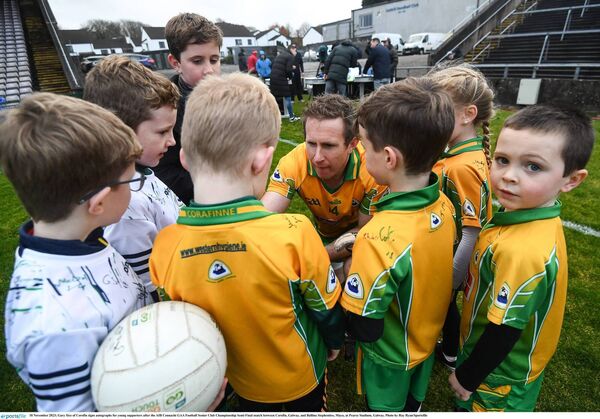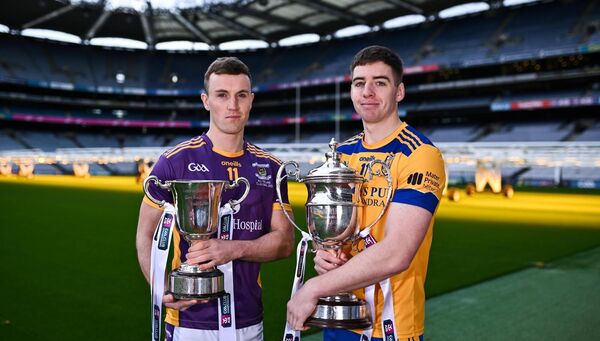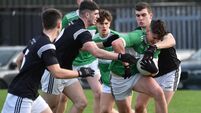Talking Points: Christy O'Connor crunches the numbers ahead of GAA club finals in Munster, Connacht and Leinster

UP FOR IT: Clonlara manager Donal Madden celebrates their Munster Club SHC semi final win over Kiladangan at Semple Stadiumy.
On the Monday night after the 2016 Clare county final replay, the Clonlara players travelled to Ballyea for the traditional post-match county final gathering. Tony Kelly and John Conlon got chatting and Conlon spoke about Clonlara’s maiden Munster club campaign in 2008, when they lost to Sarsfields from Cork.
Conlon regretted that the Clonlara players had over-celebrated that success, and had not gone for Munster with more intent. “Don’t waste this chance,” he said to Kelly. “Take it.”
Kelly was already thinking as much. He was in the gym the following morning for an individual session. Despite it being their first county title, and the dispensation that could have granted the Ballyea players, they were already looking towards Munster the following Sunday. Seven points down with eight minutes remaining in the semi-final against Thurles Sarsfields, Ballyea defied the odds to fight back and win in extra time.
Taking out one of the favourites for the All-Ireland title underlined Ballyea’s huge potential in 2016, which they subsequently confirmed in the final against Glen Rovers.
Ballyea led by nine points at half-time. The Glen scored two goals within five minutes of the restart but feeling their hot breath on their neck was just a trigger point for Ballyea to drive on, which they did, outscoring their opponents by 0-7 to 0-2 for the remainder of the match.
When the Glen were last Munster champions in 1976, Ballyea were a junior B outfit. New generations spawn new talent with the potential to create a new World Order. Yet Ballyea’s success was even more ground-breaking because of how much a rookie side had schooled a club that had once ruled that terrain.
The Glen’s dominance had existed decades before but, because the big clubs keep coming back in the club championship, there were only seven occasions in the last 40 years where a team with no – or limited – experience beat a club in the Munster final that had already won the competition, or had appeared in the final.
Even for those clubs that had previously reached a final, despite not having won it, they would have still hoped and expected that their culture and tradition would have counted against a side which didn’t have that heritage or experience to borrow from.
Across 40 years, the list is narrow. Before Ballyea’s success, it had been 13 years since a rookie side took out a big gun, with Newtownshandrum beating Patrickswell in the 2003 final; St Joseph’s Doora-Barefield beat Toomevara in the 1998 decider; Toomevara turned over Sixmilebridge in the final five years earlier; Kilmallock and Ballybrown also beat Sixmilebridge in the 1992 and 1989 finals respectively; Cashel King Cormacs took out Midleton in the 1991 decider; Kilruane MacDonaghs won their Munster title against Blackrock in the 1985 final.
There have been a number of first-time winners in Munster (who hadn’t previously appeared in a final) over the last 40 years; Na Piarsaigh, De la Salle, Loughmore Castleiney and Middleton. But they beat clubs that were also appearing in their first final; Crusheen, Adare, Tulla and Borris-Ileigh respectively.
In Leinster, the numbers are the exact same (seven), even if there was a run of first-time winners (who were first time finalists beating a team that had been on that stage before) in a short period during the last decade; between 2011-’13, Coolderry, Kilcormac-Killoughey and Mount Leinster Rangers all defeated Oulart-the-Ballagh in three successive Leinster finals.
Prior to that, O’Loughlin Gaels beat Birr in the 2003 final. When Birr first launched their crusade in 1991, they took out Ballyhale in that year’s Leinster final. The previous year, Glenmore beat Camross. In 1984, St Martin’s defeated Kinnitty. That Kinnitty side never won Leinster but they appeared in three successive finals between 1983-’85.
This weekend in Munster and Leinster, Clonlara and Na Fianna will be looking to do what only 14 other clubs across both provinces managed in the last 40 years – beat a team that has been there before and done it on this stage.
The odds – and the numbers - are certainly stacked against them.
In their mind’s eye, the Corofin players that played in the 2006 Connacht club final can still see the closing moments unfolding before them, like a car-crash slowly waiting to happen. Corofin were two points ahead deep into injury-time when St Brigid’s came raiding for the goal they desperately needed to save themselves.
Karol Mannion ran into an erected Corofin roadblock more than 20 metres from goal, but then Mannion turned back and unleashed a thunderbolt right out of the comic books. The vast hordes of Corofin supporters had been preparing for the celebratory pitch invasion but after Mannion detonated the explosion, the roof caved in.
That defeat really hurt Corofin. Since they became the first Connacht club to win an All-Ireland club title in 1998, it was their fourth time coming up short in Connacht. After becoming the first Connacht club to win an All-Ireland, Corofin had to sit back and watch Crossmolina, Ballina Stephenites, Caltra and Salthill-Knocknacarra go on and win All-Ireland club titles in four of the next seven seasons.

The manner of the Brigid’s defeat just added to the frustration of unfulfilled ambition and the failure to expand their empire beyond Galway. Corofin finally righted those wrongs in Connacht when winning successive provincial titles in 2008 and 2009, but they didn’t meet Brigid’s along the way.
When the sides did meet again, in the 2011 final in Kiltoom, it was more heartbreak for Corofin, who lost again by one point – and in controversial circumstances. At the final whistle, referee Liam Devenney and his umpires were surrounded and jostled on the pitch by irate Corofin players and supporters.
As St Brigid’s went on to win three Connacht titles in-a-row in the province between 2010-’12, Corofin were desperately trying to regain their foothold in the province. Both clubs were county champions in 2013 and 2014 but they didn’t meet in those Connacht campaigns. The next time they did though, in the 2016 Connacht final, Corofin exacted brutal retribution; their 14-point winning margin equalled the record set by Knockmore against Seán O’Heslin’s in the 1973 final. When the sides faced off again in the following year’s semi-final, Corofin won once more, but only after extra-time.
Despite the dominance of both clubs in their own counties over the last three decades, it’s a surprise that they have only met four times in the province. The result to date is 2-2. None of that is relevant ahead of Sunday’s Connacht final. But at the back of some minds in both clubs, there is always an edge to be found somewhere.
Especially for Corofin.
When Kilmacud Crokes take on Naas in Saturday’s Leinster final in Croke Park they will be looking to reach a huge landmark, both for themselves, and the province; no team has ever won three-in-a-row in Leinster. Furthermore, Leinster is the only province of the four that has never produced a three-in-a-row winning side.
Leinster did have a batch of decorated teams in the past with that pedigree; Walsh Island and UCD in the 1970s; Portlaoise in the 1980s; Thomas Davis and Éire Óg Carlow in the 1990s; St Vincent’s in the last decade.
Éire Óg won five Leinster titles in seven years between 1992-’98 but they never reached three finals in succession; neither did Vincent’s, who won three titles in four years between 2013-’16.
The only club to reach three successive finals was Portlaoise between 1985-’87. They won the 1985 and 1987 finals, against Baltinglass and Parnells, both after replays, but they lost the 1986 decider to Ferbane by one point.
Every other province has had multiple three-in-a-row (or more) winners; Crossmaglen Rangers, Burren, Scotstown and Clan na Gael (Armagh) in Ulster; Corofin, St Brigid’s and Clann na nGael (Roscommon) in Connacht; Nemo Rangers and Dr Crokes in Munster.
Leinster is harder to consistently crack because there are more teams. So can Kilmacud become the first to break through that frontier in Leinster?










